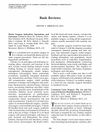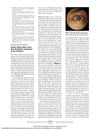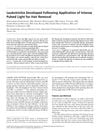 25 citations,
June 2015 in “Clinical, Cosmetic and Investigational Dermatology”
25 citations,
June 2015 in “Clinical, Cosmetic and Investigational Dermatology” Microneedling helps increase the absorption of a melanin product into hair follicles, which may improve laser hair removal effectiveness.
 22 citations,
March 2018 in “American Journal of Clinical Dermatology”
22 citations,
March 2018 in “American Journal of Clinical Dermatology” New acne treatments show promise as alternatives to traditional therapies.
 10 citations,
July 2011 in “Springer eBooks”
10 citations,
July 2011 in “Springer eBooks” Carboxytherapy can improve skin conditions with few side effects, but results may vary and are not guaranteed.
 January 2016 in “Springer eBooks”
January 2016 in “Springer eBooks” Alopecia Areata is an unpredictable autoimmune hair loss condition with limited and variable treatment effectiveness.
 5 citations,
January 2023 in “Journal of the European Academy of Dermatology and Venereology”
5 citations,
January 2023 in “Journal of the European Academy of Dermatology and Venereology” Experts advise using sunscreen and proper skin care before, during, and after procedures to speed healing, prevent complications, and reduce scarring.
 2 citations,
January 2019 in “Indian Dermatology Online Journal”
2 citations,
January 2019 in “Indian Dermatology Online Journal” The congress concluded that misuse of antifungal drugs in South Asia has led to widespread treatment failure, and new approaches and regional cooperation are needed.
 2 citations,
January 2022 in “Skin appendage disorders”
2 citations,
January 2022 in “Skin appendage disorders” A combination of methotrexate injections and CO2 laser treatment led to complete hair regrowth in two patients with hard-to-treat alopecia.
 January 2019 in “Springer eBooks”
January 2019 in “Springer eBooks” Platelet-rich plasma therapy may have benefits and is generally safe, but more research is needed to confirm its effectiveness and safety.
 9 citations,
May 2021 in “Archives of Dermatological Research”
9 citations,
May 2021 in “Archives of Dermatological Research” Home-based skin care devices are generally safe and effective for hair removal, promoting hair growth, treating wrinkles and acne, but results for psoriasis treatment are mixed.
 42 citations,
September 2018 in “Journal der Deutschen Dermatologischen Gesellschaft”
42 citations,
September 2018 in “Journal der Deutschen Dermatologischen Gesellschaft” Adult female acne requires a comprehensive treatment approach, including medical options and lifestyle changes, with attention to psychological well-being.
 41 citations,
April 2010 in “Gender Medicine”
41 citations,
April 2010 in “Gender Medicine” The conclusion is that hirsutism should be diagnosed and treated because it affects quality of life and may signal other health problems.
 December 2002 in “International Journal of Cosmetic Surgery and Aesthetic Dermatology”
December 2002 in “International Journal of Cosmetic Surgery and Aesthetic Dermatology” The books are valuable resources for cosmetic surgery and dermatology professionals.
 178 citations,
August 2016 in “Advances in wound care”
178 citations,
August 2016 in “Advances in wound care” New effective scar treatments are urgently needed due to the current options' limited success.
17 citations,
October 2017 in “Journal of cosmetic and laser therapy” Laser hair removal is effective and safe for reducing facial hair in women with PCOS and improves their psychological well-being.
21 citations,
April 2019 in “Journal of cosmetic and laser therapy” Laser hair removal is popular for long-term hair reduction but carries risks, requiring well-trained operators and better regulations, especially in South Africa.
194 citations,
October 2018 in “Microbiome” Acne is linked to complex skin microbe interactions, and new findings suggest microbiome-based treatments could be effective.
 67 citations,
October 1997 in “Dermatologic Surgery”
67 citations,
October 1997 in “Dermatologic Surgery” The EpiLight Hair Removal System removed about 60% of hair with some side effects, and more research is needed to confirm long-term effectiveness.
 195 citations,
January 2008 in “Photochemistry and Photobiology”
195 citations,
January 2008 in “Photochemistry and Photobiology” Visible light can damage skin and most sunscreens don't block it well; more research is needed on its effects and protection methods.
 134 citations,
September 2008 in “Lasers in surgery and medicine”
134 citations,
September 2008 in “Lasers in surgery and medicine” Low fluence photoepilation temporarily removes hair by targeting the hair follicle's pigmented area without severe damage.
 112 citations,
July 1998 in “Journal of Investigative Dermatology”
112 citations,
July 1998 in “Journal of Investigative Dermatology” Ruby laser pulses best destroy hair follicles during the growth phase and effectiveness varies with laser intensity; melanin is key for targeting, and timing treatments can improve results.
 31 citations,
October 2012 in “Archives of ophthalmology”
31 citations,
October 2012 in “Archives of ophthalmology” Laser hair reduction near the eyebrows can cause serious eye injuries even with safety measures.
 13 citations,
January 2014 in “Aesthetic Surgery Journal”
13 citations,
January 2014 in “Aesthetic Surgery Journal” Cyperus rotundus oil effectively reduces unwanted hair without side effects.
 10 citations,
January 2003 in “Seminars in reproductive medicine”
10 citations,
January 2003 in “Seminars in reproductive medicine” The article explains how to identify and treat excessive hair growth in women, which can be distressing and may signal other health problems.
 7 citations,
August 2018 in “South African Medical Journal”
7 citations,
August 2018 in “South African Medical Journal” Clinicians should understand tattoos to manage health issues, as tattoos can cause complications and affect medical assessments.
 3 citations,
July 2011 in “Expert Review of Dermatology”
3 citations,
July 2011 in “Expert Review of Dermatology” Effective treatments for excessive hair growth in women include creams, laser therapy, and medications, with the choice depending on individual needs and potential side effects.
 2 citations,
January 2012 in “Journal of metabolic syndrome”
2 citations,
January 2012 in “Journal of metabolic syndrome” The document concludes that hirsutism can be managed with various treatments tailored to the individual, potentially improving quality of life.
 July 2002 in “Dermatologic Surgery”
July 2002 in “Dermatologic Surgery” Some people's hair turned white or gray after using intense pulsed light for hair removal, and for some, it was permanent.
 378 citations,
November 2011 in “Human reproduction update”
378 citations,
November 2011 in “Human reproduction update” Experts recommend using evidence-based methods to diagnose and treat hirsutism, focusing on symptoms and underlying causes.
 169 citations,
August 2004 in “Baillière's best practice & research. Clinical obstetrics & gynaecology/Baillière's best practice and research in clinical obstetrics and gynaecology”
169 citations,
August 2004 in “Baillière's best practice & research. Clinical obstetrics & gynaecology/Baillière's best practice and research in clinical obstetrics and gynaecology” Lower doses of treatments for hirsutism and acne in PCOS are effective and cause fewer side effects.
 140 citations,
January 2009 in “JEADV. Journal of the European Academy of Dermatology and Venereology/Journal of the European Academy of Dermatology and Venereology”
140 citations,
January 2009 in “JEADV. Journal of the European Academy of Dermatology and Venereology/Journal of the European Academy of Dermatology and Venereology” Liposomes improve drug delivery and reduce skin irritation in dermatology.


























